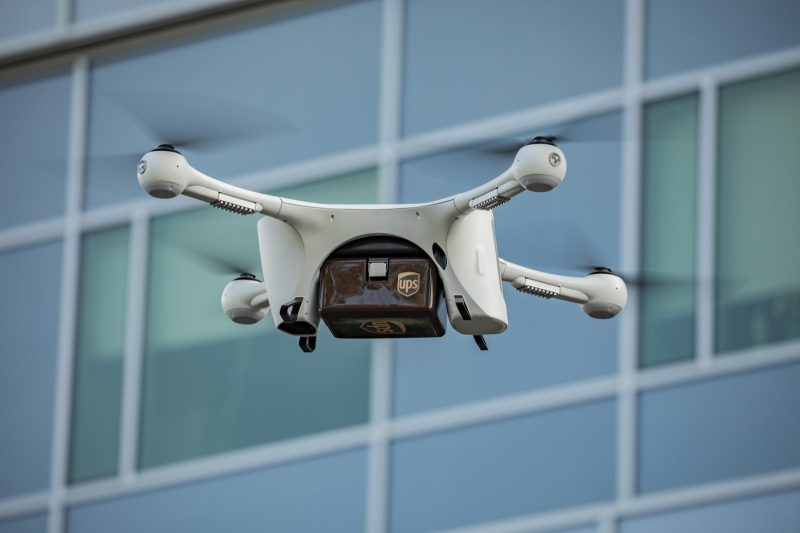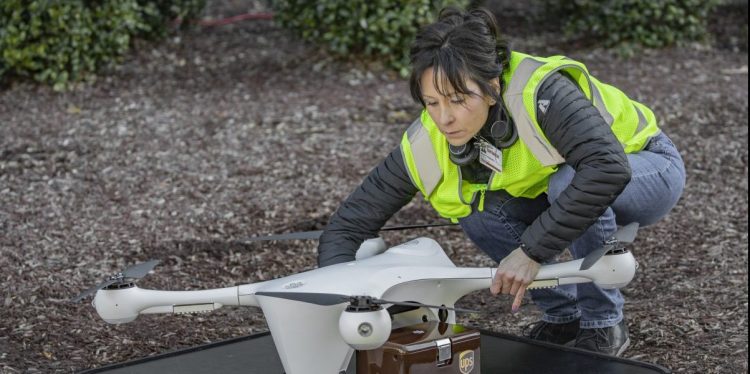Watch all the Transform 2020 sessions on-demand here.
In March 2019, drone platform provider Matternet collaborated with UPS to launch an aerial delivery service from WakeMed’s flagship hospital and campus in Raleigh, with flights taking place roughly daily. Evidently it went swimmingly, because the two companies today announced plans to expand the pilot to the University of California San Diego Health system, as part of UPS’ Flight Forward program. Matternet’s drones are scheduled to begin transporting various medical products between health centers and labs in February.
According to UPS, lab professionals at Jacobs Medical Center, which is located on the east health campus of UC San Diego in La Jolla, will be tasked with loading medical items such as blood samples and documents into a secure drone container that attaches to one of Matternet’s 22-pound M2 rechargeable drones. The drones in question will follow predetermined flight paths, initially between Jacobs Medical Center and special landing sites at Moores Cancer Center, which is located about a mile away and within visual line of sight, and then at the Center for Advanced Laboratory Medicine near the Jacobs Medical Center. Flights are expected to take only minutes to complete and will be monitored by a team of remote operators.
“Our healthcare and life sciences team has been delivering innovation for over 19 years, and the UPS medical drone program is just another example of our commitment to making life easier for patients,” said UPS vice president of healthcare and life science strategy Dan Gagnon in a statement. “We’re thrilled to work with UC San Diego Health to get patient diagnostics samples to the lab in a more consistent and expedited manner. Having test results back into the doctor’s hands means diagnosis and treatment can happen sooner rather than later.”
The trial was made possible by the U.S. Federal Aviation Administration’s ongoing Integration Pilot Program (IPP), in which the City of San Diego is actively participating. IPP, which began in 2017, aims to bring together state, local, and tribal governments together with private sector entities, such as drone operators and manufacturers, to test and evaluate the integration of civil and public drone operations into the national airspace system. Other participants include the City of Reno, the University of Alaska-Fairbanks, the Memphis Shelby County Airport Authority, the Kansas Department of Transportation, and Herndon’s Innovation and Entrepreneurship Investment Authority.
June 5th: The AI Audit in NYC
Join us next week in NYC to engage with top executive leaders, delving into strategies for auditing AI models to ensure fairness, optimal performance, and ethical compliance across diverse organizations. Secure your attendance for this exclusive invite-only event.

Months prior to the expanded Matternet-UPS collaboration — which comes as Matternet raises a strategic investment from McKesson Ventures, bringing its total capital raised from $25.5 million to over $30 million — UPS’ Flight Forward won full FAA approval to kick off regular commercial drone deliveries. Under the Part 135 Standard certification, UPS expanded delivery service beyond drone pilots’ lines of sight and doubled the number of flights it’s making for North Carolina’s WakeMed.
As for Matternet, it launched a partnership with Switzerland-based Swiss Post and became one of the first companies to be authorized for full operations of drone delivery over cities. Its pilot programs haven’t been without bumps in the road — Swiss Post decided to temporarily ground operations after two incidents in 2019, one of which crashed in a forested area where kids were playing nearby — but it claims it’s flown more than 1,500 flights at WakeMed and delivered close to 8,000 lab samples to date. And operations with Swiss Post resumed this month.
“We’re very excited to launch this operation at UC San Diego Health in partnership with UPS. With UCSD Health having multiple facilities with frequent urgent deliveries between them, our goal is to connect them all and create a highly automated, on-demand transportation system for medical items,” Matternet CEO Andreas Raptopoulos said. “Drone delivery has huge potential to improve speed of patient care, and we’re thrilled to bring these benefits to many more patients in the U.S.”
UPS is doubling down on a drone logistics and delivery market that’s anticipated to be worth $29.06 billion by 2027, forging ahead against rivals like Flytrex, Uber, FedEx, and Amazon. In 2016, the logistics giant teamed up with Zipline and international health care alliance Gavi in 2016 to deliver blood products to remote locations in Rwanda. And in early 2017, it tested a drone that launches from the top of a UPS van to autonomously drop off packages as the delivery driver makes a separate delivery.
Reports show the commercial drone industry is continuing to grow quickly, albeit from a small base. A 2017 forecast from Gartner projected the number of commercial drones sold that year would exceed 174,000. Moreover, about $454 million was thrown at UAV startups in 2016 alone, and the market is forecast to be worth $127 billion by 2020.


